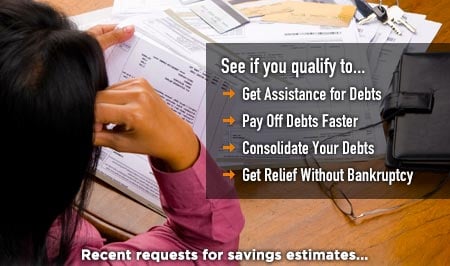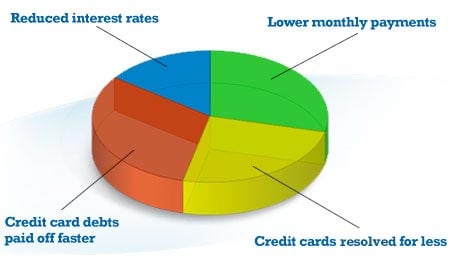
Debt Settlement
Debt settlement is a subject not many of us are willing to talk about; yet simply ignoring debt won't make it go away. Because it is an issue so many Americans are grappling with these days, it's no surprise that companies offering debt relief services have sprung up across the country. You may have come across offers that sound like this, "Let a professional debt settlement company help you cut your debt in half!" Such offers may be tempting to someone who is really desperate for a way out of debt, but do these ads really help resolve your debt? You should understand all aspects of debt settlement before moving forward -- including the savings you are likely to realize, how long it will take to realize those savings, the legal risks of debt settlement, as well as the risks to your personal credit.
See how debt relief can help you. Answer a few, simple questions to get a free debt relief estimate and savings analysis - at no cost to you.
Clearly, debt settlement is a popular method of debt relief because it does offer many consumers a way to settle credit card debts, potentially for much less than is owed. Under a debt settlement program, companies will typically advise their clients to stop making payments to credit card companies and, instead, use that money to establish a set-aside fund that can eventually be used to make a bonafide and realistic settlement offer to a credit card company.
Debt Consolidation
Be careful not to confuse debt settlement with other methods of debt reduction like consolidation (or a debt management program), where your high-interest debts will be consolidated into a single, lower payment each month. With debt consolidation, you will work with credit counselors who will make proposals on your behalf, requesting that credit card companies reduce interest rates, and waive fees and penalties and possibly securing more favorable more affordable, repayment terms. Florida Debt Relief can help you learn more about the the pros and cons related to debt relief options, and the potential money-saving benefits each one offers.
Benefits of Debt Settlement
Not surprisingly, some credit card companies don't like to advertise debt settlement and make it a difficult route to pursue because in essence, they will be settling for a lesser amount than what you originally owed. But consider this: If a creditor "sells off" what they consider to be "bad debt"-or the amount they are likely not going to collect to a third-party debt collector, they may get as little as 10 cents on the dollar. Even worse, if you decide to file straight bankruptcy, those creditors will get nothing if your debt is discharged. Essentially, if those creditors receive a fair and reasonable offer from you, and they truly appreciate the fact that you are going through financial hardship, they may agree to settle your debt for substantially less than you owe.
It is important to note that many consumers opt to approach credit card companies directly requesting a settlement, and it is not unusual for a credit card company to consider such offers, particularly if you have fallen seriously behind. However, many people do not have the confidence or comfort level to approach credit card companies directly and they would rather evaluate the services of a professional debt settlement company.
If working with a debt settlement company is more your preference, it pays to do your research as the debt settlement industry includes the risk of working with a company that may not have fully disclosed all the facts and risks associated with settlement, as well as the fees. Just how much can you expect to pay a debt settlement company? Some companies demand 14 to 18 percent of the total value of the debt you want settled, others may charge a percentage of the debt savings once you settle.
Explore your debt relief options. Request a free debt relief estimate and savings analysis, at no obligation to you.
Potential Risks
Another word of caution: Debt settlement may harm your credit score. Negative marks may continue to hit your score until creditors get their settlement. Some creditors, once they know that you are working with a debt settlement company, may even send threatening letters or even sue you to collect the full amount that you owe. Another thing you should know about debt settlement: The Internal Revenue Service may consider forgiven debt to be taxable income. In some cases, that amount can push people to fall deeper in debt because they failed to consider the tax consequences. And, based on reports from the Federal Trade Commission (FTC) and other industry watchdogs, there is a high drop-out rate among consumers in debt settlement programs.
You may wonder then, with all the potential risks involved in debt settlement, why is it such a popular debt relief method? Many people do consider it a viable option when they are severely in debt and are willing to pay whatever reduced amount that they can settle with their creditors. Also, in some cases, some creditors may agree to bring your account to a current status once you settle, which can help to minimize the damage to your credit.
Debt Settlement vs. Bankruptcy
Some consumers may also prefer debt settlement to declaring personal bankruptcy-which will typically impact their credit score longer, for a period of 10 years. You may also take solace in the fact that there are now regulations in place that make it more difficult for deceptive debt settlement companies to charge consumers hefty fees and make false claims regarding their services. The FTC now requires debt negotiation companies to make specific disclosures to potential clients-such as how long it will take to settle their debts, what exactly are their fees, and the potential negative consequences from getting debt relief services. This law was established in response to complaints received by the Better Business Bureau (BBB) about deceptive debt settlement companies that drove more people even deeper into debt. What this all means is that it is now illegal for debt settlement services, unless they are attorney-based, to charge you upfront fees before they negotiate, and settle, on your behalf, with creditors.
Do Your Research
So regardless of which debt reduction option you choose, the bottom line is: Make sure you know all the facts and ask the right questions. And if you choose to settle your debts-whether on your own or with the help of a debt settlement company-make sure that you know exactly how much in true savings you will actually realize, how long it will take you to accumulate a lump-sum amount that you can pay to your creditors, and how your credit might be impacted. Know your debt relief options and take the steps necessary to become debt free. In doing so, you will give yourself and your family the greatest opportunity to build a future that is not filled with stress over finances but, hopefully, filled with smart financial decisions today that serve you well for a lifetime.
Request a free debt relief analysis and savings estimate in minutes. Start by answering a few, simple questions here.























